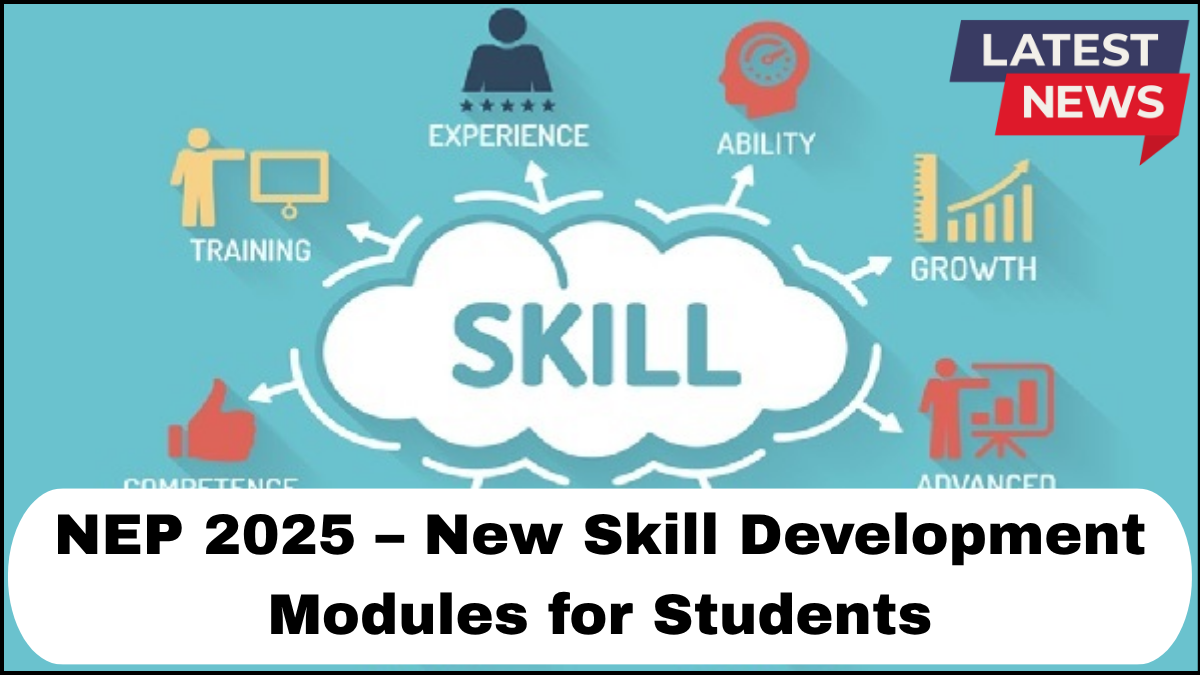The National Education Policy (NEP) 2025 marks a turning point in India’s approach to education, especially in how it emphasizes skill development as a core component of student learning. With a clear departure from rote-based systems, this policy aims to equip students with practical competencies aligned with the needs of a rapidly evolving global economy.
The introduction of NEP Skill Development 2025 is not just an upgrade—it’s a transformation. It reshapes the very foundation of learning by integrating industry-relevant skills, modern pedagogy, and flexible learning pathways across all educational stages.

A Shift from Theoretical Learning to Real-World Skills
One of the most significant changes under NEP 2025 is the prioritization of skill-based learning over purely academic memorization. The policy recognizes that traditional classroom education must evolve to prepare students for dynamic careers in sectors like technology, healthcare, green energy, and entrepreneurship.
New skill development modules are designed to be embedded into school and higher education curriculums. These modules cover:
-
Digital literacy and coding from an early age
-
Critical thinking and problem-solving exercises integrated into all subjects
-
Communication and collaboration workshops across grade levels
-
Financial literacy and entrepreneurship basics in secondary education
This hands-on, application-oriented structure ensures students are job-ready and capable of adapting to varied professional roles after graduation.
Modular and Multidisciplinary Learning Framework
A cornerstone of NEP Skill Development 2025 is the flexible modular structure, allowing students to select and pursue skills based on their interests and career aspirations.
Under this model:
-
Students can earn micro-credentials in fields like artificial intelligence, robotics, or digital marketing alongside their main academic programs.
-
Skill modules are offered in tiers (basic, intermediate, advanced) to cater to diverse learning paces and backgrounds.
-
Partnerships with industry bodies, startups, and vocational institutes ensure practical exposure through internships, mentorships, and live projects.
By combining academic learning with professional skills, NEP 2025 creates a hybrid education ecosystem that mirrors real-world demands.
Integration with Digital Infrastructure and EdTech
To implement skill modules at scale, NEP 2025 leverages technology-enabled education reforms. The government’s Digital Infrastructure for Knowledge Sharing (DIKSHA) platform will be expanded to host interactive skill development courses, gamified assessments, and AI-driven feedback systems.
Students will also gain access to:
-
Virtual labs for STEM-based experimentation
-
AI tutors and learning analytics for personalized education plans
-
Skill-tracking dashboards to monitor progress and suggest improvements
Such initiatives ensure equity in access, particularly for students in rural and underprivileged areas.
Role of Teachers and Educators in the New Skill Paradigm
With this shift, the role of educators transforms from content deliverers to facilitators of skill-based learning. NEP 2025 mandates rigorous training programs for teachers, equipping them to:
-
Incorporate experiential learning techniques
-
Use project-based evaluation instead of standard tests
-
Promote a growth mindset among students
These reforms aim to cultivate not just skills, but also curiosity, resilience, and self-learning capabilities among learners.
Building Employability from School to Higher Education
By introducing skill development at the foundational level and continuing through higher education, NEP 2025 builds a continuum of competence. Students are encouraged to develop portfolios, participate in real-world projects, and take part in cross-disciplinary learning.
Moreover, higher education institutions (HEIs) are being incentivized to collaborate with industry partners to co-develop curriculums, host skill bootcamps, and offer credit-based apprenticeships. This practical immersion bridges the academia-industry gap and boosts employability.
Addressing Future Workforce Needs
As India eyes a knowledge-driven economy, NEP Skill Development 2025 is designed to prepare a workforce that’s not only educated but skilled, innovative, and future-ready.
Key areas of focus include:
-
Green skills for sustainability-related careers
-
AI and data science modules for digital economy roles
-
Healthcare and biotechnology upskilling for post-pandemic industries
-
Cultural and creative arts for preserving heritage while creating new-age professions
These targeted modules reflect an awareness of global job market trends and aim to place Indian students on par with their international peers.
Frequently Asked Questions (FAQs)
Q1. What is NEP Skill Development 2025?
NEP Skill Development 2025 is a reform initiative under India’s National Education Policy that introduces skill-oriented modules in school and higher education to equip students with practical and employable skills.
Q2. Which skills are included in NEP 2025 modules?
The policy includes digital literacy, coding, financial management, entrepreneurship, problem-solving, communication, and sector-specific skills like AI, green energy, and healthcare.
Q3. Are these skill modules compulsory?
While core modules are integrated into the curriculum, students also have the option to choose advanced modules based on their interests and career goals.
Q4. How will these skills be assessed?
Assessment methods will focus on project work, practical application, and continuous evaluation rather than one-time exams.
Q5. How does NEP 2025 benefit rural or underprivileged students?
With digital platforms, mobile access, and localized content, NEP 2025 ensures equitable access to quality skill training for all students, regardless of location or background.
click here to learn more